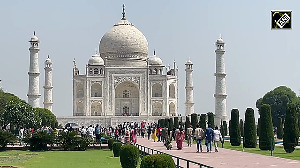There are some interesting, and even educative, takeaways from the US elections, says Mahesh Vijapurkar.
A lot has been said and written about the just-concluded United States presidential elections but a few things struck me as how they and we -- the US and us -- conduct ourselves as if we are on two different planets. More importantly, because we both have an adjective in common: they are the 'biggest' democracy, geography-wise, and we too are the biggest, population-wise. At least, we have a pretence to being a democracy.
There are some interesting, and even educative, takeaways from the US elections. For one, the way the winner, Barack Obama, and the loser, Mitt Romney spoke after the results were called. They showed grace in victory and more importantly grace and maturity in defeat, respectively. In a country now without bipartisan consensus, Romney said it was time to "reach across aisles" and work for the country.
Obama glossed over the election-time differences and mentioned how whether a voter was on the Romney plank or the Obama plank, the effort was to have a better President, indicating that his hard fought win was a direction to improve upon his first term and the country deserves the best. No US President gets a third chance, and this was his last opportunity to be written about well in history books. He did not speak clichés, he was not patronising, and he did not take voters for granted.
The second takeaway was the presence of families on the stage at every crucial turn of the election, from the pre-primaries to the victor's rally as well as Romney's concession speech. The families came just for the moment to show that with the country, the values included families. The election rallies saw the voters holding American Stars and Stripes. The campaign was about the nation and its future, especially the next four years, and less about politicians.
This was refreshing. It, of course, offers the compulsion to draw parallels between them and us. In India, once the ballot boxes throw out the results, the defeated go into hiding, for instance, as when the trends emerged during the recent UP assembly polls. Mayawati's party offices were locked, the workers were nowhere in sight, and as if once the counting was done, she had no use for the voters. At least, till the next time.
No political party in India decides to thank the voters for trying to elect a person who manages to lose. There never is an expression of gratitude for the share of votes that were sent their way, for the effort that kept them in the race in hope. The best one gets is that the party would examine the reasons for a defeat, as if the whys and wherefores were not evident to the leadership. If it was not, they are not worth being leaders at all.
Mark my word, come the next Lok Sabha elections, where the issue would decidedly be corruption, the defeated would say much the same thing. Though, right now, the leaders of both sides, the Congress-led United Progressive Alliance on one hand, and the Bharatiya Janata Party-led National Democratic Alliance on the other, know that the option before the voters is a serious dilemma: should they pull down the ruling alliance for good reasons offered so far, or pull down the Opposition?
Both, it so happens, have much the same strong reasons to be defeated. That between the two of them and their respective partners, there is nothing to choose from, and that they, but for the different names, flags and election symbols, are much the same: rotten to the core, without an explanation for their greed apart from greed itself, and refusal to convincingly curb the menace of graft. At least China has identified graft as its enemy number one.
Unlike the Americans, we have a much different role for families than of being symbolic it being a valued institution. There, they were on the stage to offer photo opportunities, underscoring it. In India, family is an institution alright but one that implies a dynasty. If the son is seen around with a father, then the son is the anointed heir and the people are being graphically being told about it. In the case of many politicians, we hardly know anything about them if they have no heir in the wings.
This is a country which accepted Indira Gandhi as a successor to Jawaharlal Nehru, Rajiv Gandhi as a successor to Indira, Sonia Gandhi as a successor to the heirloom called power left behind by Rajiv Gandhi and the entire country is waiting, as if it is a given, for Rahul Gandhi to take over from the mother.
This applies for the Mulayam Singh Yadav family, it does too for the Sharad Pawar family, Rajashekhar Reddy family, and in virtually all constituencies the district's fiefdoms are power blocks which shall support the most powerful dynasty at the state level.
In short, to the Indian politicians, the country is not their objective at all but a ruse. We have allowed them to manipulate their way to eternal mischief without realising that our woes would be unending.
Mahesh Vijapurkar is a Thane-based commentator who takes the commoner's views seriously.









